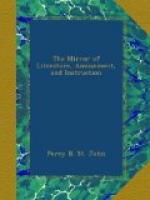* * * * *
SACRED POETRY.
Songs and hymns, in honour of their Gods, are found among all people who have either religion or verse. There is scarcely any pagan poetry, ancient or modern, in which allusions to the national mythology are not so frequent as to constitute the most copious materials, as well as the most brilliant embellishments. The poets of Persia and Arabia, in like manner, have adorned their gorgeous strains with the fables and morals of the Koran. The relics of Jewish song which we possess, with few exceptions, are consecrated immediately to the glory of God, by whom, indeed, they were inspired. The first Christians were wont to edify themselves in psalms and hymns, and spiritual songs; and though we have no specimens of these left, except the occasional doxologies ascribed to the redeemed in the Book of Revelation, it cannot be doubted that they used not only the psalms of the Old Testament, literally, or accommodated to the circumstances of a new and rising Church, but that they had original lays of their own, in which they celebrated the praises of Christ, as the Saviour of the world. In the middle ages, the Roman Catholic and Greek churches statedly adopted singing as an essential part of public worship; but this, like the reading of the Scriptures, was too frequently in an unknown tongue, by an affectation of wisdom, to excite the veneration of ignorance, when the learned, in their craftiness, taught that “Ignorance is the mother of devotion;” and Ignorance was very willing to believe it. At the era of the Reformation, psalms and hymns, in the vernacular tongue, were revived in Germany, England, and elsewhere, among the other means of grace, of which Christendom had been for centuries defrauded.—Montgomery.
* * * * *
SUPERSTITION.
Grievously are they mistaken who think that the revival of literature was the death of superstition—that ghosts, demons, and exorcists retreated before the march of intellect, and fled the British shore along with monks, saints, and masses. Superstition, deadly superstition, may co-exist with much learning, with high civilization, with any religion, or with utter irreligion. Canidia wrought her spells in the Augustan age, and Chaldean fortune-tellers haunted Rome in the sceptical days of Juvenal. Matthew Hopkins, the witch-finder, and Lilly, the astrologer, were contemporaries of Selden, Harrington, and Milton. Perhaps there never was a more superstitious period than that which produced Erasmus and Bacon. _—Blackwood’s Mag._
* * * * *
“FELLOW” FEELING.




